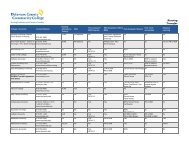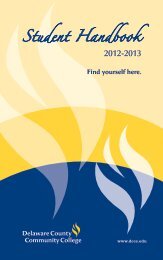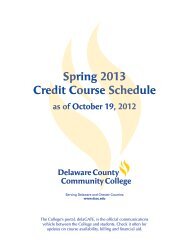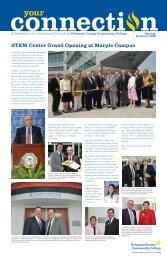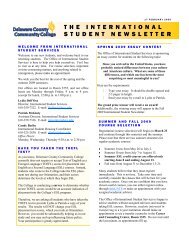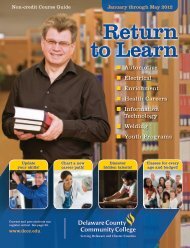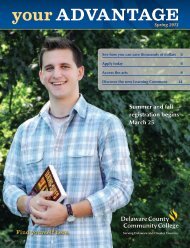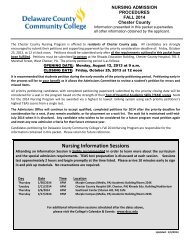2010 Catalog - Delaware County Community College
2010 Catalog - Delaware County Community College
2010 Catalog - Delaware County Community College
Create successful ePaper yourself
Turn your PDF publications into a flip-book with our unique Google optimized e-Paper software.
COURSE DESCRIPTIONS 75<br />
COURSE DESCRIPTIONS<br />
Course Numbering System<br />
• A departmental abbreviation precedes the course number; e.g., ENG 100, English Composition I.<br />
Only courses numbered 100 or above are applicable toward a degree.<br />
• Number of credits and meeting hours for each course are listed after each course description.<br />
• Any prerequisites: listed must be completed before registering for a course. Co-requisites listed may be<br />
taken at the same time as the indicated course. Prerequisites: for humanities electives may be waived<br />
with permission of the instructor.<br />
• Not all courses are offered each semester. A schedule of course offerings is published for each semester.<br />
• Special Studies courses are offered by specific academic areas. Topics will be announced for specific<br />
course requirements along with lecture and laboratory hours, credits and a brief course description.<br />
ACC 100<br />
(ACC) Accounting<br />
Applied Accounting<br />
This course provides students with an understanding<br />
of the accounting cycle for service and merchandising<br />
firms. In addition, students reconcile bank accounts and<br />
maintain a manual payroll system. This course is<br />
intended for students in most career business curricula.<br />
This course is generally not transferable.<br />
Upon successful completion of this course, students<br />
should be able to:<br />
• Record representative journal entries, post them to the<br />
general ledger, foot and balance the accounts, prepare a<br />
trial balance and complete a work sheet, financial<br />
statements and the remainder of the accounting cycle<br />
for a single proprietorship.<br />
• Record representative business transactions for a<br />
merchandising business utilizing the appropriate<br />
special journals.<br />
• Prepare all documents necessary for the maintenance of<br />
a checking account and prepare a bank reconciliation.<br />
• Maintain and reconcile accounts receivable and accounts<br />
payable ledgers with appropriate control accounts.<br />
• Compute and record adjustments for plant assets, prepaid<br />
expenses, merchandise inventory and accrued expenses.<br />
• Maintain a payroll system.<br />
Prereq. ENG 050, REA 050, MAT 040<br />
3 Credits 3 Weekly Lecture Hours<br />
ACC 111<br />
Financial Accounting<br />
This course provides students with a comprehensive treatment<br />
of the complete accounting cycle for both service and<br />
merchandising businesses in accordance with Generally<br />
Accepted Accounting Principles (GAAP). The course also<br />
focuses on accounting systems, concepts, issues and the<br />
preparation and analysis of financial statements.<br />
Upon successful completion of this course, students<br />
should be able to:<br />
• Perform all the steps of the accounting cycle in accordance<br />
with GAAP for service and merchandising businesses.<br />
• Prepare financial statements for sole proprietorships,<br />
partnerships and corporations.<br />
• Calculate quantities and dollar amounts of merchandise<br />
inventory and cost of goods sold using GAAP and<br />
IRS methodologies.<br />
• Provide for uncollectible accounts receivable and<br />
calculate the estimated amount of accounts receivable<br />
that will ultimately be collected.<br />
• Calculate depreciation, depletion and amortization, and<br />
calculate the book value of plant and intangible assets.<br />
• Broadly describe the principles of internal control over<br />
assets and the accounting profession's Code of Ethics.<br />
• Discuss the income tax consequences resulting from the<br />
use of alternate GAAP methodologies.<br />
• Describe the differences among cash, accrual and other<br />
comprehensive bases of accounting.<br />
• Make calculations and prepare journal entries for<br />
various end-of-period adjustments.<br />
• Make calculations and prepare journal entries for the<br />
issuance and redemption of debt and equity securities<br />
by corporations.<br />
Prereq. ENG 050, REA 050, MAT 060<br />
3 Credits 3 Weekly Lecture Hours<br />
ACC 112<br />
Managerial Accounting<br />
This course focuses on the use of accounting in the<br />
development of the managerial functions of planning,<br />
controlling and decision-making. Special emphasis is<br />
given to the various processes which assist managers<br />
obtain optimum results. Students learn what kind of<br />
accounting information is needed by managers, where<br />
the information can be obtained, how to analyze the<br />
information and how to provide clear, concise and<br />
meaningful information to managers.<br />
Upon successful completion of this course, students<br />
should be able to:<br />
• Describe the various environments in which managerial<br />
accounting functions.<br />
• Describe situations where managerial and financial<br />
methodologies need to be different.<br />
• Prepare a statement of Cash Flows.<br />
• Analyze financial statements using comparative, trend<br />
and ratio analysis.<br />
• Discuss the advantages and disadvantages of different<br />
approaches to allocations.<br />
• Develop operating and capital budgets.<br />
• Prepare performance evaluation reports to compare<br />
actual results to budgets.Illustrate and describe the<br />
concepts and accounting recording requirements of<br />
process and job order cost accounting systems.<br />
• Prepare reports and analysis utilizing systems and<br />
techniques which enable management to perform their<br />
functions of planning, controlling and decision making.<br />
Prereq. ACC 111<br />
3 Credits<br />
3 Weekly Lecture Hours<br />
ACC 115<br />
Computerized Accounting<br />
This course provides students with an understanding<br />
of computer applications of the accounting cycle using an<br />
accounting computer software program. In addition,<br />
students will utilize a spreadsheet program to perform a<br />
bank reconciliation, inventory costing, depreciation<br />
methods and payroll.<br />
Upon successful completion of this course, students<br />
should be able to:<br />
• Develop on a computer a chart of accounts, record representative<br />
journal entries, and prepare a trial balance and<br />
financial statements for a service proprietorship.<br />
• Record on a computer representative business<br />
transactions for a merchandising business utilizing the<br />
appropriate special journals.<br />
• Complete a worksheet and a multiple step income<br />
statement for a merchandising business on a computer.<br />
• Maintain and reconcile accounts receivable and<br />
accounts payable ledgers on a computer with<br />
appropriate control accounts.<br />
• Prepare all documents necessary for the maintenance of<br />
a checking account and prepare a bank reconciliation.<br />
• Maintain a payroll system.<br />
• Compute depreciation expense and merchandise<br />
inventory values on a computer using various methods.<br />
• Compute basic analytic measures and ratios.<br />
Prereq. ACC 100 or ACC 111 and DPR 100<br />
4 Credits 3 Weekly Lecture Hours<br />
2 Weekly Laboratory Hours<br />
ACC 201<br />
Introduction to Cost Accounting<br />
This course provides students with a thorough<br />
understanding of cost accounting concepts, cost<br />
behaviors, and cost accounting techniques as applied to<br />
manufacturing cost systems.<br />
Upon successful completion of this course, students<br />
should be able to:<br />
• Apply factory overhead to work in progress production units.<br />
• Define factors to be considered in establishing standard costs.<br />
• Compute and analyze variances from standard using<br />
the two variances methods.<br />
• Determine the basis and calculate cost allocations.<br />
• Prepare budgets and variance analysis.<br />
Prereq. ACC 100 or ACC 111<br />
3 Credits 3 Weekly Lecture Hours<br />
ACC 202<br />
Introduction to Tax Accounting<br />
The primary objective of this course is to gain a<br />
practical understanding of the personal income tax,<br />
various payroll taxes and the Pennsylvania sales tax.<br />
Students will demonstrate an understanding of these<br />
taxes by making appropriate calculations and preparing<br />
current tax forms. This is a required course for students<br />
in the accounting curriculum and an elective for students<br />
enrolled in other career programs. Credit for this course<br />
will not be given to students who attain credit for Federal<br />
Income Tax Accounting (ACC 210).<br />
Upon successful completion of this course, students<br />
should be able to:<br />
• Discuss the history and objectives of the U.S. tax system.<br />
• Determine who must file a tax return, filing status,<br />
personal and dependent exemptions and the<br />
standard deduction.<br />
• Identify items to be included in and excluded from<br />
gross income.<br />
• Calculate capital gains and losses.<br />
• Complete tax returns for the self-employed.




